Public Service Ethics: Application of Theories and Analysis
VerifiedAdded on 2020/12/09
|7
|1636
|436
Report
AI Summary
This report delves into the realm of public service ethics, examining the function of ethics in modern Australian society. It explores two major ethical theories: deontology and consequentialism, detailing their ideas and influential philosophers. The report then applies these theories to a case study involving an elderly man and the decision to apprehend or not apprehend him. The analysis includes the application of the Queensland Public Service (QPS) test, potential consequences of actions, and ethical responses. Furthermore, the report discusses the Public Sector Ethics Act 1994 and the Code of Conduct for the Queensland Public Service, outlining ethical principles, their nature, purpose, application, and importance. The report concludes with a list of references from books and journals.

Promote the values and ethos of
public service
public service
Paraphrase This Document
Need a fresh take? Get an instant paraphrase of this document with our AI Paraphraser
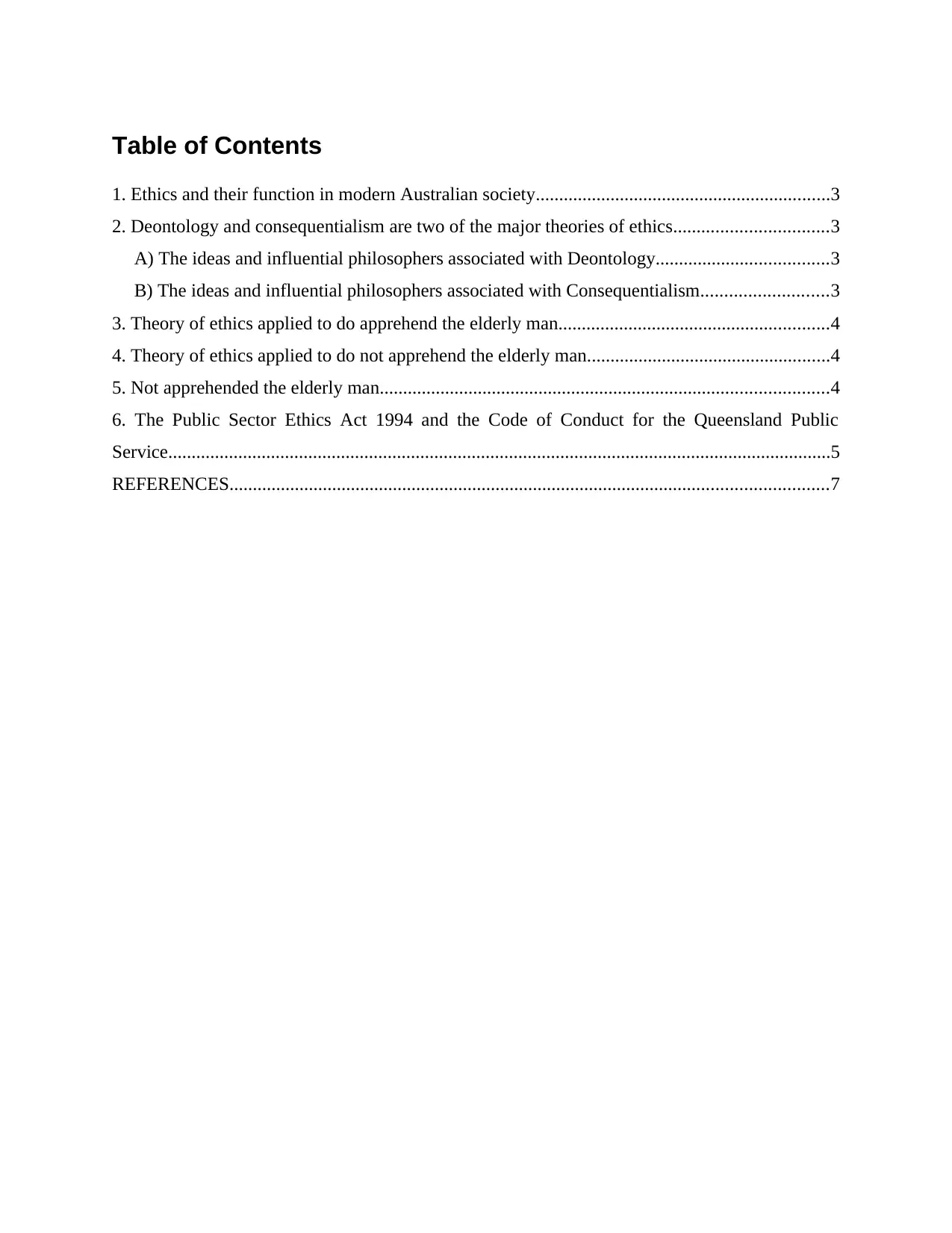
Table of Contents
1. Ethics and their function in modern Australian society...............................................................3
2. Deontology and consequentialism are two of the major theories of ethics.................................3
A) The ideas and influential philosophers associated with Deontology.....................................3
B) The ideas and influential philosophers associated with Consequentialism...........................3
3. Theory of ethics applied to do apprehend the elderly man..........................................................4
4. Theory of ethics applied to do not apprehend the elderly man....................................................4
5. Not apprehended the elderly man................................................................................................4
6. The Public Sector Ethics Act 1994 and the Code of Conduct for the Queensland Public
Service..............................................................................................................................................5
REFERENCES................................................................................................................................7
1. Ethics and their function in modern Australian society...............................................................3
2. Deontology and consequentialism are two of the major theories of ethics.................................3
A) The ideas and influential philosophers associated with Deontology.....................................3
B) The ideas and influential philosophers associated with Consequentialism...........................3
3. Theory of ethics applied to do apprehend the elderly man..........................................................4
4. Theory of ethics applied to do not apprehend the elderly man....................................................4
5. Not apprehended the elderly man................................................................................................4
6. The Public Sector Ethics Act 1994 and the Code of Conduct for the Queensland Public
Service..............................................................................................................................................5
REFERENCES................................................................................................................................7
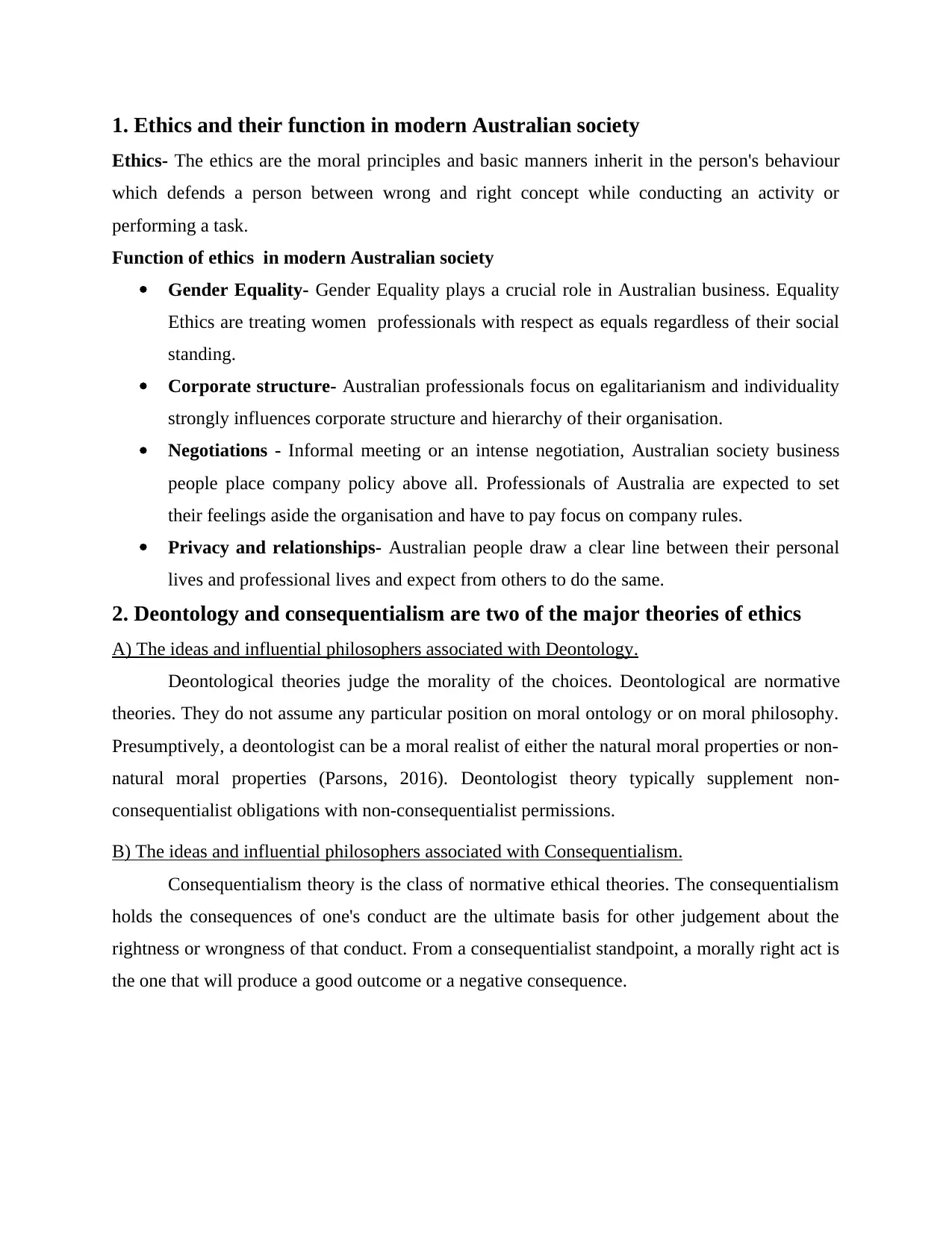
1. Ethics and their function in modern Australian society
Ethics- The ethics are the moral principles and basic manners inherit in the person's behaviour
which defends a person between wrong and right concept while conducting an activity or
performing a task.
Function of ethics in modern Australian society
Gender Equality- Gender Equality plays a crucial role in Australian business. Equality
Ethics are treating women professionals with respect as equals regardless of their social
standing.
Corporate structure- Australian professionals focus on egalitarianism and individuality
strongly influences corporate structure and hierarchy of their organisation.
Negotiations - Informal meeting or an intense negotiation, Australian society business
people place company policy above all. Professionals of Australia are expected to set
their feelings aside the organisation and have to pay focus on company rules.
Privacy and relationships- Australian people draw a clear line between their personal
lives and professional lives and expect from others to do the same.
2. Deontology and consequentialism are two of the major theories of ethics
A) The ideas and influential philosophers associated with Deontology.
Deontological theories judge the morality of the choices. Deontological are normative
theories. They do not assume any particular position on moral ontology or on moral philosophy.
Presumptively, a deontologist can be a moral realist of either the natural moral properties or non-
natural moral properties (Parsons, 2016). Deontologist theory typically supplement non-
consequentialist obligations with non-consequentialist permissions.
B) The ideas and influential philosophers associated with Consequentialism.
Consequentialism theory is the class of normative ethical theories. The consequentialism
holds the consequences of one's conduct are the ultimate basis for other judgement about the
rightness or wrongness of that conduct. From a consequentialist standpoint, a morally right act is
the one that will produce a good outcome or a negative consequence.
Ethics- The ethics are the moral principles and basic manners inherit in the person's behaviour
which defends a person between wrong and right concept while conducting an activity or
performing a task.
Function of ethics in modern Australian society
Gender Equality- Gender Equality plays a crucial role in Australian business. Equality
Ethics are treating women professionals with respect as equals regardless of their social
standing.
Corporate structure- Australian professionals focus on egalitarianism and individuality
strongly influences corporate structure and hierarchy of their organisation.
Negotiations - Informal meeting or an intense negotiation, Australian society business
people place company policy above all. Professionals of Australia are expected to set
their feelings aside the organisation and have to pay focus on company rules.
Privacy and relationships- Australian people draw a clear line between their personal
lives and professional lives and expect from others to do the same.
2. Deontology and consequentialism are two of the major theories of ethics
A) The ideas and influential philosophers associated with Deontology.
Deontological theories judge the morality of the choices. Deontological are normative
theories. They do not assume any particular position on moral ontology or on moral philosophy.
Presumptively, a deontologist can be a moral realist of either the natural moral properties or non-
natural moral properties (Parsons, 2016). Deontologist theory typically supplement non-
consequentialist obligations with non-consequentialist permissions.
B) The ideas and influential philosophers associated with Consequentialism.
Consequentialism theory is the class of normative ethical theories. The consequentialism
holds the consequences of one's conduct are the ultimate basis for other judgement about the
rightness or wrongness of that conduct. From a consequentialist standpoint, a morally right act is
the one that will produce a good outcome or a negative consequence.
⊘ This is a preview!⊘
Do you want full access?
Subscribe today to unlock all pages.

Trusted by 1+ million students worldwide
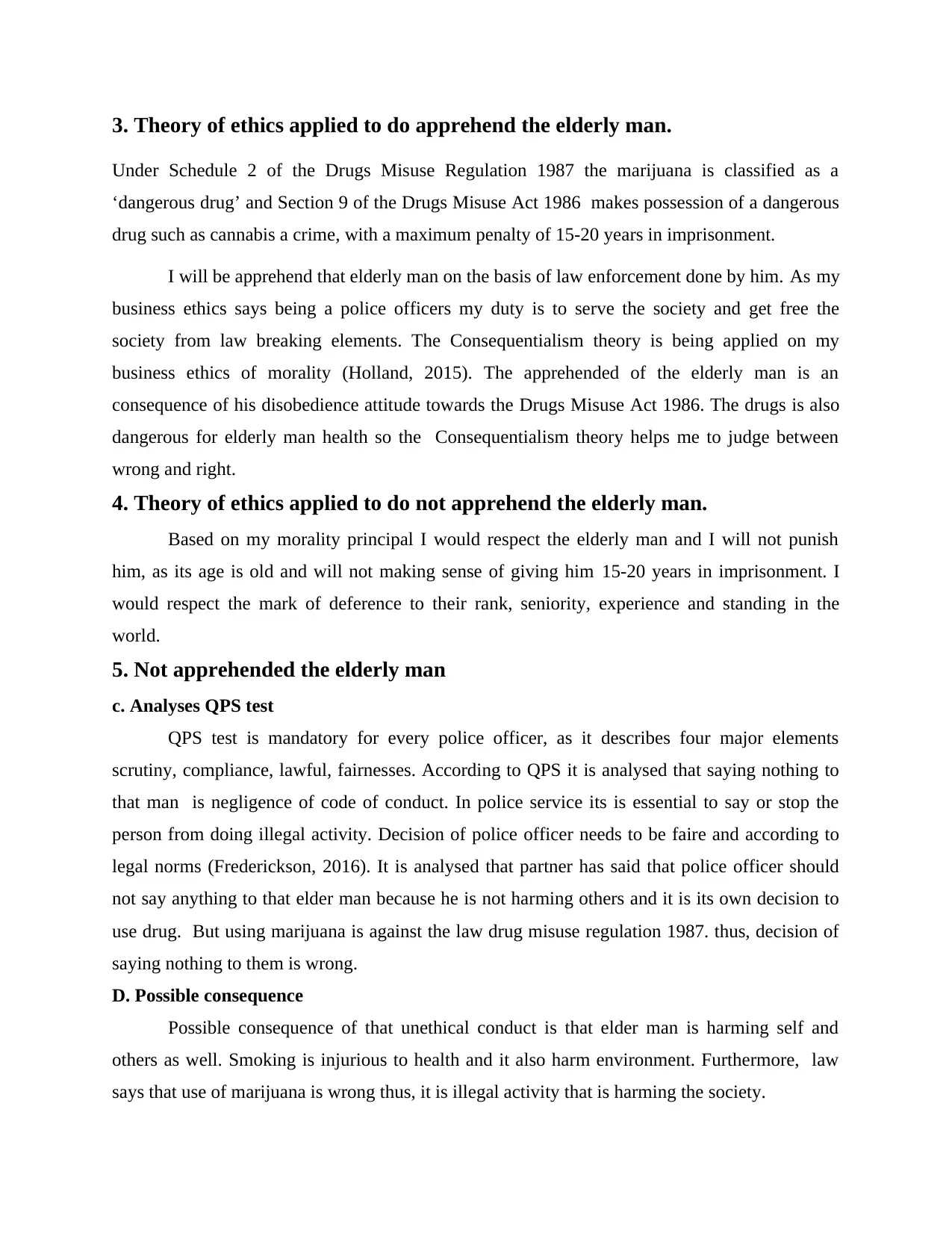
3. Theory of ethics applied to do apprehend the elderly man.
Under Schedule 2 of the Drugs Misuse Regulation 1987 the marijuana is classified as a
‘dangerous drug’ and Section 9 of the Drugs Misuse Act 1986 makes possession of a dangerous
drug such as cannabis a crime, with a maximum penalty of 15-20 years in imprisonment.
I will be apprehend that elderly man on the basis of law enforcement done by him. As my
business ethics says being a police officers my duty is to serve the society and get free the
society from law breaking elements. The Consequentialism theory is being applied on my
business ethics of morality (Holland, 2015). The apprehended of the elderly man is an
consequence of his disobedience attitude towards the Drugs Misuse Act 1986. The drugs is also
dangerous for elderly man health so the Consequentialism theory helps me to judge between
wrong and right.
4. Theory of ethics applied to do not apprehend the elderly man.
Based on my morality principal I would respect the elderly man and I will not punish
him, as its age is old and will not making sense of giving him 15-20 years in imprisonment. I
would respect the mark of deference to their rank, seniority, experience and standing in the
world.
5. Not apprehended the elderly man
c. Analyses QPS test
QPS test is mandatory for every police officer, as it describes four major elements
scrutiny, compliance, lawful, fairnesses. According to QPS it is analysed that saying nothing to
that man is negligence of code of conduct. In police service its is essential to say or stop the
person from doing illegal activity. Decision of police officer needs to be faire and according to
legal norms (Frederickson, 2016). It is analysed that partner has said that police officer should
not say anything to that elder man because he is not harming others and it is its own decision to
use drug. But using marijuana is against the law drug misuse regulation 1987. thus, decision of
saying nothing to them is wrong.
D. Possible consequence
Possible consequence of that unethical conduct is that elder man is harming self and
others as well. Smoking is injurious to health and it also harm environment. Furthermore, law
says that use of marijuana is wrong thus, it is illegal activity that is harming the society.
Under Schedule 2 of the Drugs Misuse Regulation 1987 the marijuana is classified as a
‘dangerous drug’ and Section 9 of the Drugs Misuse Act 1986 makes possession of a dangerous
drug such as cannabis a crime, with a maximum penalty of 15-20 years in imprisonment.
I will be apprehend that elderly man on the basis of law enforcement done by him. As my
business ethics says being a police officers my duty is to serve the society and get free the
society from law breaking elements. The Consequentialism theory is being applied on my
business ethics of morality (Holland, 2015). The apprehended of the elderly man is an
consequence of his disobedience attitude towards the Drugs Misuse Act 1986. The drugs is also
dangerous for elderly man health so the Consequentialism theory helps me to judge between
wrong and right.
4. Theory of ethics applied to do not apprehend the elderly man.
Based on my morality principal I would respect the elderly man and I will not punish
him, as its age is old and will not making sense of giving him 15-20 years in imprisonment. I
would respect the mark of deference to their rank, seniority, experience and standing in the
world.
5. Not apprehended the elderly man
c. Analyses QPS test
QPS test is mandatory for every police officer, as it describes four major elements
scrutiny, compliance, lawful, fairnesses. According to QPS it is analysed that saying nothing to
that man is negligence of code of conduct. In police service its is essential to say or stop the
person from doing illegal activity. Decision of police officer needs to be faire and according to
legal norms (Frederickson, 2016). It is analysed that partner has said that police officer should
not say anything to that elder man because he is not harming others and it is its own decision to
use drug. But using marijuana is against the law drug misuse regulation 1987. thus, decision of
saying nothing to them is wrong.
D. Possible consequence
Possible consequence of that unethical conduct is that elder man is harming self and
others as well. Smoking is injurious to health and it also harm environment. Furthermore, law
says that use of marijuana is wrong thus, it is illegal activity that is harming the society.
Paraphrase This Document
Need a fresh take? Get an instant paraphrase of this document with our AI Paraphraser
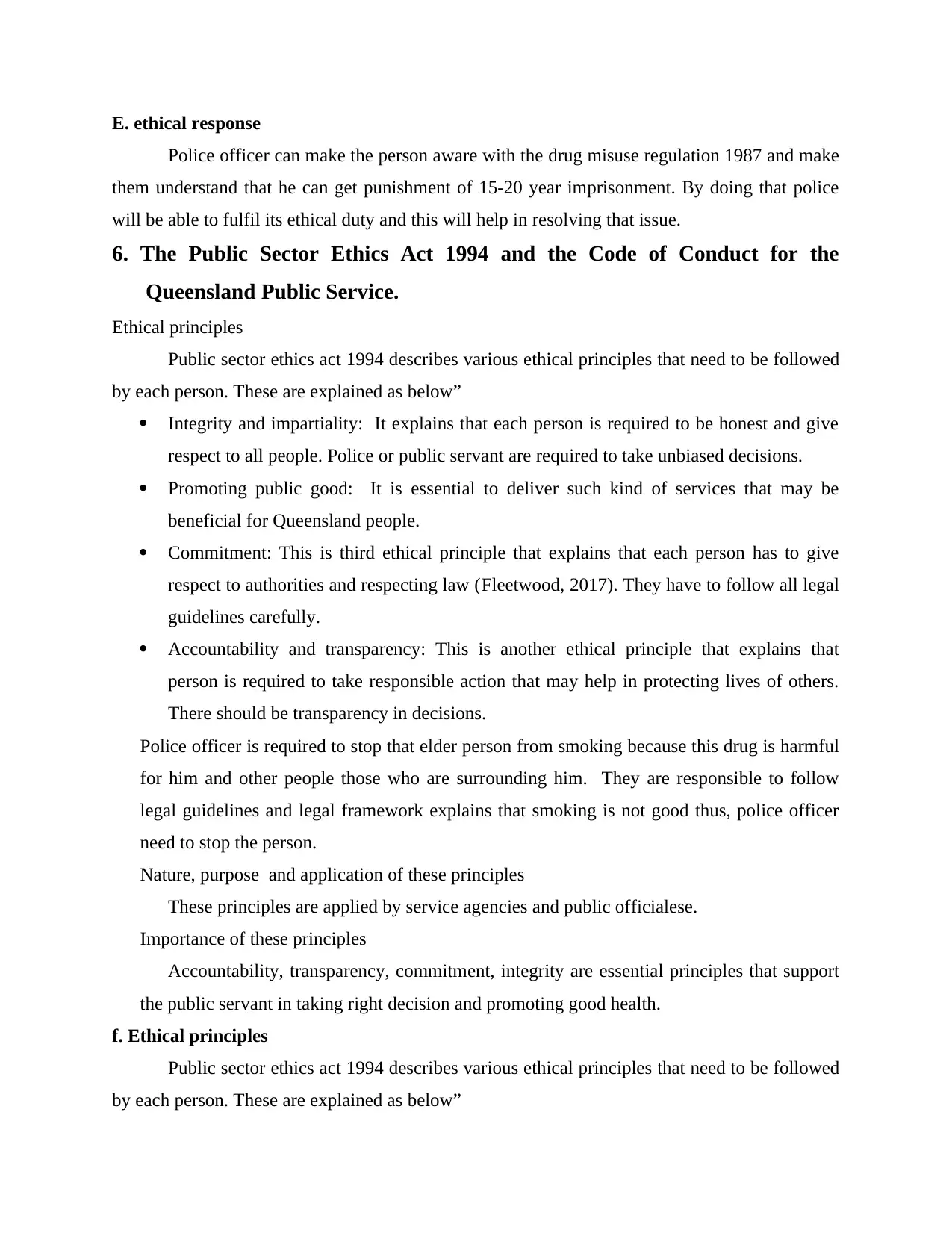
E. ethical response
Police officer can make the person aware with the drug misuse regulation 1987 and make
them understand that he can get punishment of 15-20 year imprisonment. By doing that police
will be able to fulfil its ethical duty and this will help in resolving that issue.
6. The Public Sector Ethics Act 1994 and the Code of Conduct for the
Queensland Public Service.
Ethical principles
Public sector ethics act 1994 describes various ethical principles that need to be followed
by each person. These are explained as below”
Integrity and impartiality: It explains that each person is required to be honest and give
respect to all people. Police or public servant are required to take unbiased decisions.
Promoting public good: It is essential to deliver such kind of services that may be
beneficial for Queensland people.
Commitment: This is third ethical principle that explains that each person has to give
respect to authorities and respecting law (Fleetwood, 2017). They have to follow all legal
guidelines carefully.
Accountability and transparency: This is another ethical principle that explains that
person is required to take responsible action that may help in protecting lives of others.
There should be transparency in decisions.
Police officer is required to stop that elder person from smoking because this drug is harmful
for him and other people those who are surrounding him. They are responsible to follow
legal guidelines and legal framework explains that smoking is not good thus, police officer
need to stop the person.
Nature, purpose and application of these principles
These principles are applied by service agencies and public officialese.
Importance of these principles
Accountability, transparency, commitment, integrity are essential principles that support
the public servant in taking right decision and promoting good health.
f. Ethical principles
Public sector ethics act 1994 describes various ethical principles that need to be followed
by each person. These are explained as below”
Police officer can make the person aware with the drug misuse regulation 1987 and make
them understand that he can get punishment of 15-20 year imprisonment. By doing that police
will be able to fulfil its ethical duty and this will help in resolving that issue.
6. The Public Sector Ethics Act 1994 and the Code of Conduct for the
Queensland Public Service.
Ethical principles
Public sector ethics act 1994 describes various ethical principles that need to be followed
by each person. These are explained as below”
Integrity and impartiality: It explains that each person is required to be honest and give
respect to all people. Police or public servant are required to take unbiased decisions.
Promoting public good: It is essential to deliver such kind of services that may be
beneficial for Queensland people.
Commitment: This is third ethical principle that explains that each person has to give
respect to authorities and respecting law (Fleetwood, 2017). They have to follow all legal
guidelines carefully.
Accountability and transparency: This is another ethical principle that explains that
person is required to take responsible action that may help in protecting lives of others.
There should be transparency in decisions.
Police officer is required to stop that elder person from smoking because this drug is harmful
for him and other people those who are surrounding him. They are responsible to follow
legal guidelines and legal framework explains that smoking is not good thus, police officer
need to stop the person.
Nature, purpose and application of these principles
These principles are applied by service agencies and public officialese.
Importance of these principles
Accountability, transparency, commitment, integrity are essential principles that support
the public servant in taking right decision and promoting good health.
f. Ethical principles
Public sector ethics act 1994 describes various ethical principles that need to be followed
by each person. These are explained as below”
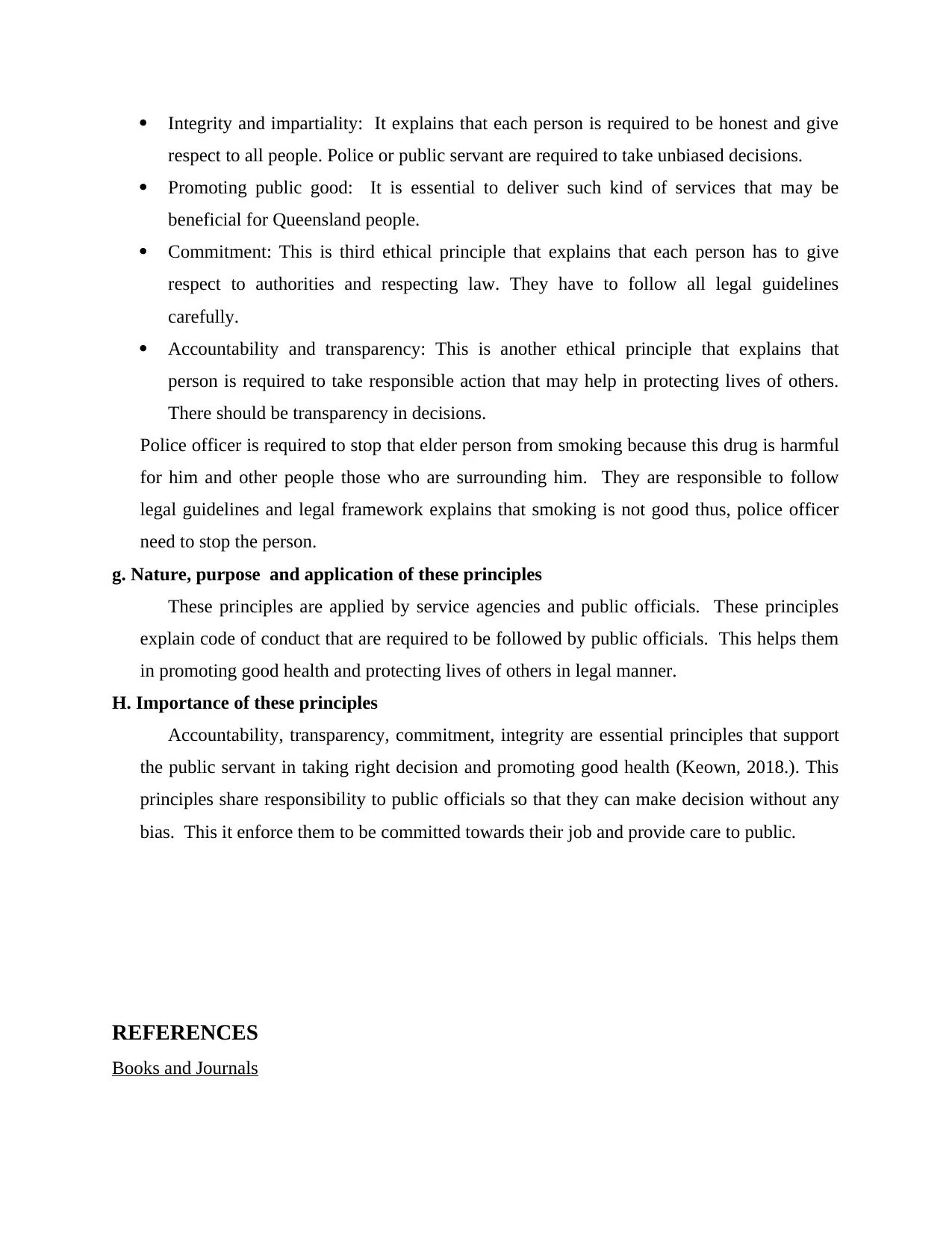
Integrity and impartiality: It explains that each person is required to be honest and give
respect to all people. Police or public servant are required to take unbiased decisions.
Promoting public good: It is essential to deliver such kind of services that may be
beneficial for Queensland people.
Commitment: This is third ethical principle that explains that each person has to give
respect to authorities and respecting law. They have to follow all legal guidelines
carefully.
Accountability and transparency: This is another ethical principle that explains that
person is required to take responsible action that may help in protecting lives of others.
There should be transparency in decisions.
Police officer is required to stop that elder person from smoking because this drug is harmful
for him and other people those who are surrounding him. They are responsible to follow
legal guidelines and legal framework explains that smoking is not good thus, police officer
need to stop the person.
g. Nature, purpose and application of these principles
These principles are applied by service agencies and public officials. These principles
explain code of conduct that are required to be followed by public officials. This helps them
in promoting good health and protecting lives of others in legal manner.
H. Importance of these principles
Accountability, transparency, commitment, integrity are essential principles that support
the public servant in taking right decision and promoting good health (Keown, 2018.). This
principles share responsibility to public officials so that they can make decision without any
bias. This it enforce them to be committed towards their job and provide care to public.
REFERENCES
Books and Journals
respect to all people. Police or public servant are required to take unbiased decisions.
Promoting public good: It is essential to deliver such kind of services that may be
beneficial for Queensland people.
Commitment: This is third ethical principle that explains that each person has to give
respect to authorities and respecting law. They have to follow all legal guidelines
carefully.
Accountability and transparency: This is another ethical principle that explains that
person is required to take responsible action that may help in protecting lives of others.
There should be transparency in decisions.
Police officer is required to stop that elder person from smoking because this drug is harmful
for him and other people those who are surrounding him. They are responsible to follow
legal guidelines and legal framework explains that smoking is not good thus, police officer
need to stop the person.
g. Nature, purpose and application of these principles
These principles are applied by service agencies and public officials. These principles
explain code of conduct that are required to be followed by public officials. This helps them
in promoting good health and protecting lives of others in legal manner.
H. Importance of these principles
Accountability, transparency, commitment, integrity are essential principles that support
the public servant in taking right decision and promoting good health (Keown, 2018.). This
principles share responsibility to public officials so that they can make decision without any
bias. This it enforce them to be committed towards their job and provide care to public.
REFERENCES
Books and Journals
⊘ This is a preview!⊘
Do you want full access?
Subscribe today to unlock all pages.

Trusted by 1+ million students worldwide
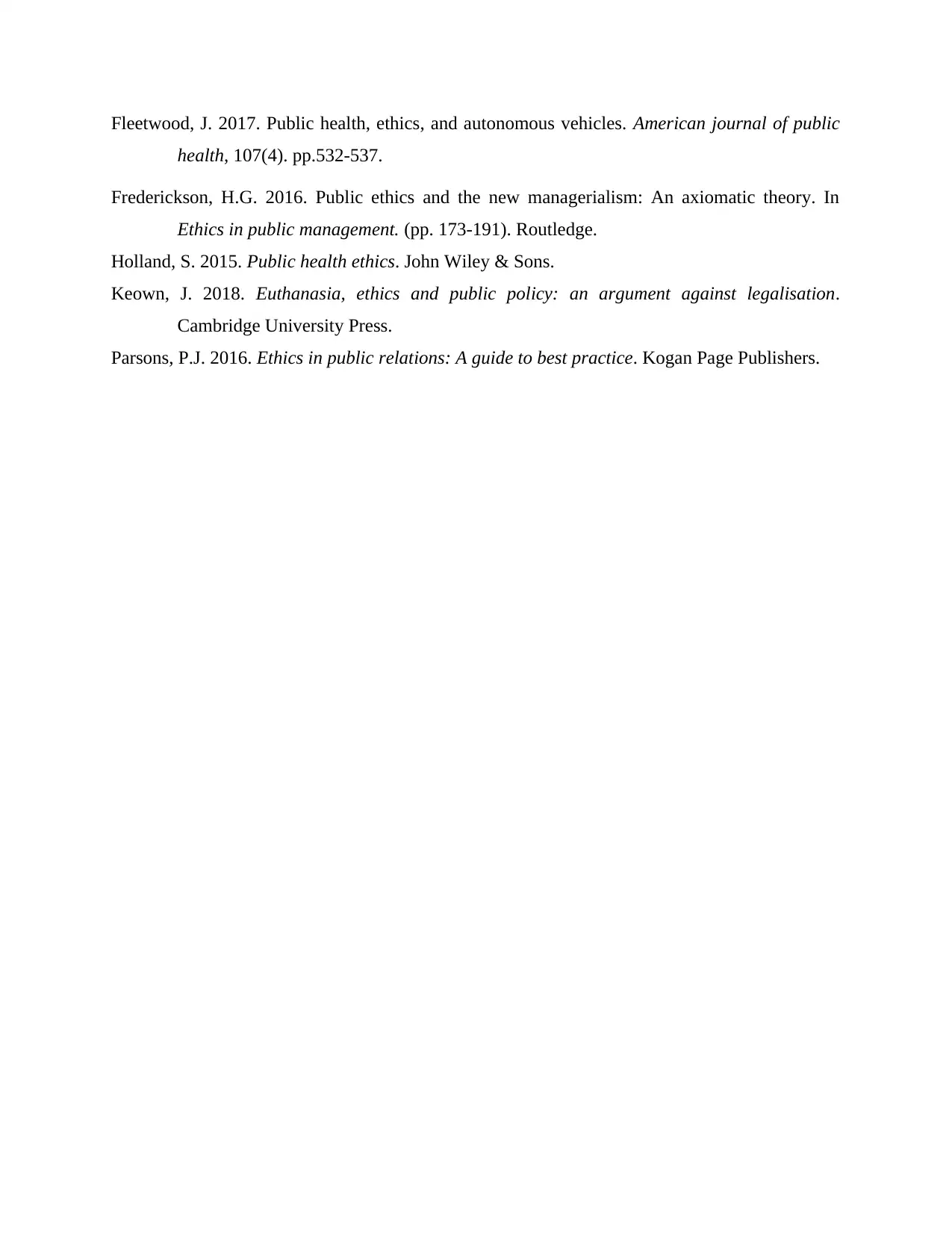
Fleetwood, J. 2017. Public health, ethics, and autonomous vehicles. American journal of public
health, 107(4). pp.532-537.
Frederickson, H.G. 2016. Public ethics and the new managerialism: An axiomatic theory. In
Ethics in public management. (pp. 173-191). Routledge.
Holland, S. 2015. Public health ethics. John Wiley & Sons.
Keown, J. 2018. Euthanasia, ethics and public policy: an argument against legalisation.
Cambridge University Press.
Parsons, P.J. 2016. Ethics in public relations: A guide to best practice. Kogan Page Publishers.
health, 107(4). pp.532-537.
Frederickson, H.G. 2016. Public ethics and the new managerialism: An axiomatic theory. In
Ethics in public management. (pp. 173-191). Routledge.
Holland, S. 2015. Public health ethics. John Wiley & Sons.
Keown, J. 2018. Euthanasia, ethics and public policy: an argument against legalisation.
Cambridge University Press.
Parsons, P.J. 2016. Ethics in public relations: A guide to best practice. Kogan Page Publishers.
1 out of 7
Your All-in-One AI-Powered Toolkit for Academic Success.
+13062052269
info@desklib.com
Available 24*7 on WhatsApp / Email
![[object Object]](/_next/static/media/star-bottom.7253800d.svg)
Unlock your academic potential
Copyright © 2020–2026 A2Z Services. All Rights Reserved. Developed and managed by ZUCOL.

